| Where: | Formerly Whitstable, Kent - town centre,harbour areas and Tankerton Slopes |
| When: | Formerly a Weekend in late July |
| Time: | Formerly From 9.30 am on Saturday - check links for schedule |
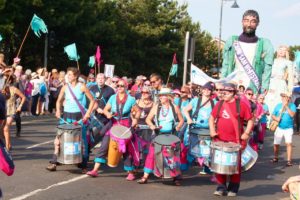
The oyster was a staple of the Whitstable economy and the focus of the festivities was the harbour area of the little town. As well as exhibitions and displays, there were numerous musical and other events including appearances by local side Dead Horse Morris, fireworks and building of “grotters” from oyster shells. The festival began with the Landing of the Oysters, the first catch of the season, at Long Beach, which used to be followed by the Oyster Parade through town accompanied by local worthies, giants,music and fancy dress. On Sunday there was the Sea Sunday service celebrating all things maritime at St Alphege’s Church in the High Street from 9.30 (parade from 10.15) and during the afternoon there was an Oyster Eating Competition at the Harbour – it’s for over 18s only and the person to eat 6 oysters in the fastest time won!
Helpful Hints
The Oyster Festival hasn’t happened now for several years- the Whitstable Rocks Oyster Festival from 2022 and 2024 in September incorporated many of the elements of the former festivities – details and date of the next one are yet to be released (see link below).
Click here for more on Whitstable Rocks: https://whitstablerocksoysterfestival.com
Click here for the Whitstable Rocks website: https://www.squaremeal.co.uk/restaurants/best-for/whitstable-oyster-festival-guide_9574
From 2017 the festival was significantly changed and was evolving from year to year – see Facebook page link for details of schedule. The main focus was at Harbour Stage, where the food fair and Oyster Eating Competition now take place.
Click here for the Facebook page: https://www.facebook.com/whitstableoysterfestival
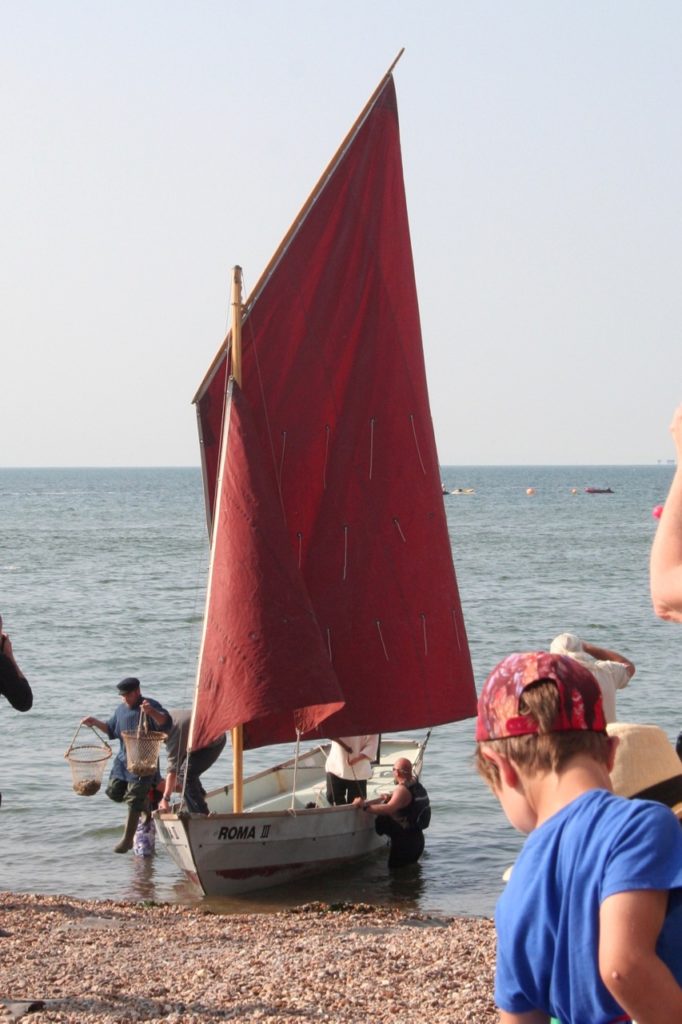
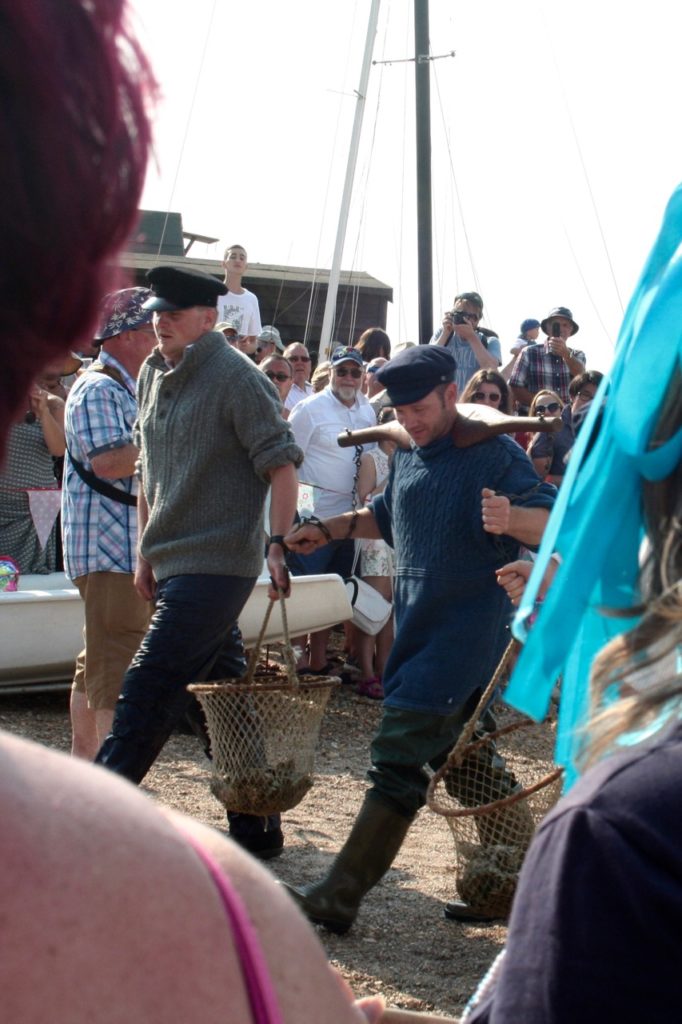
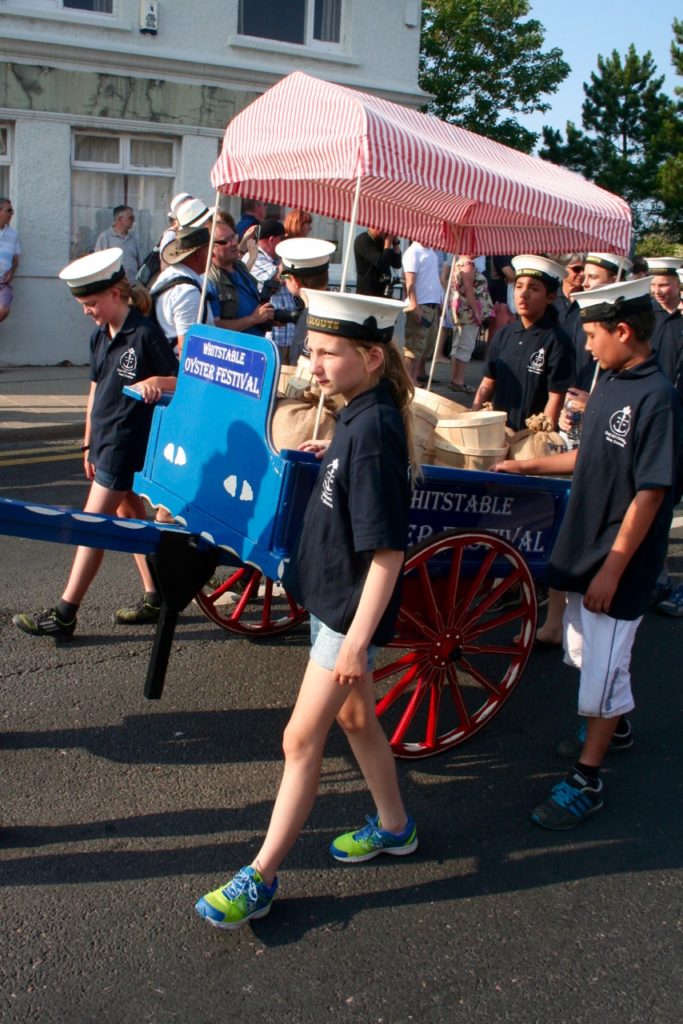
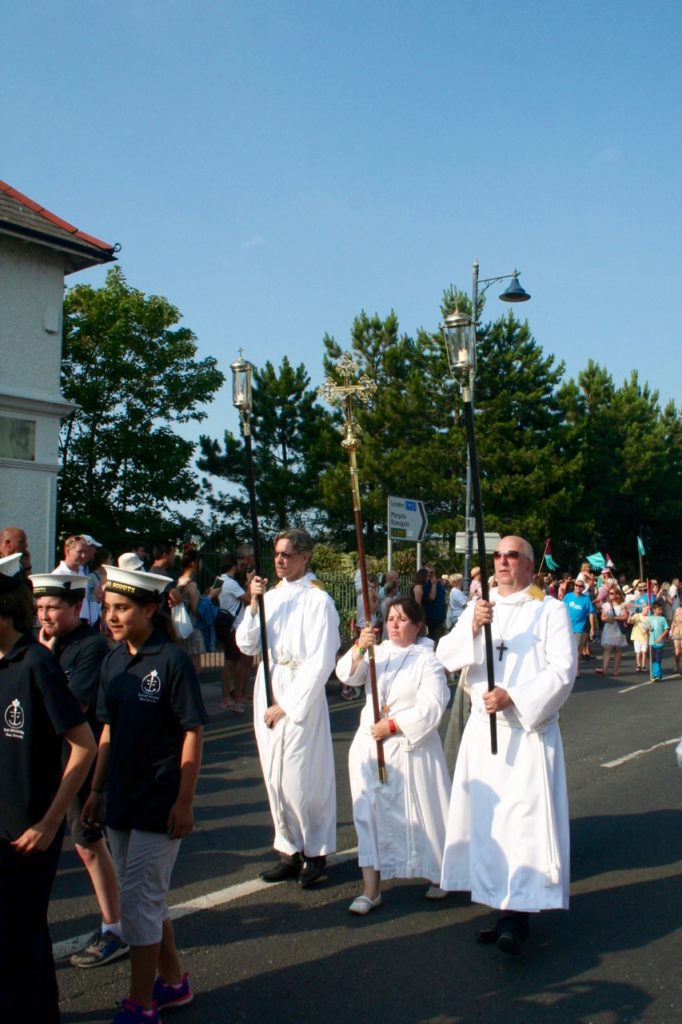
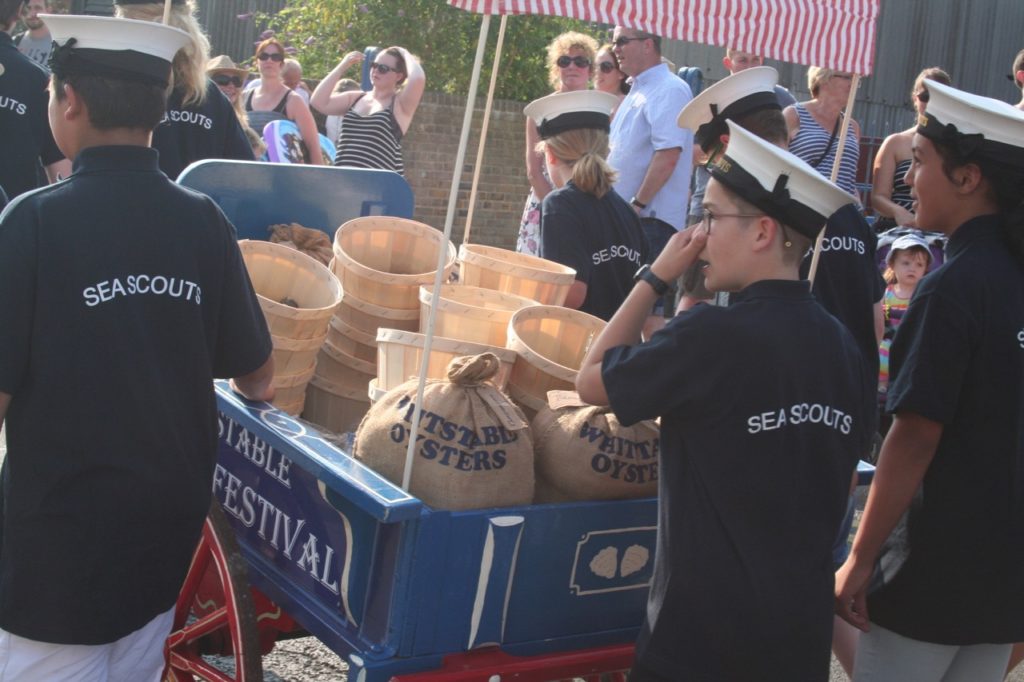
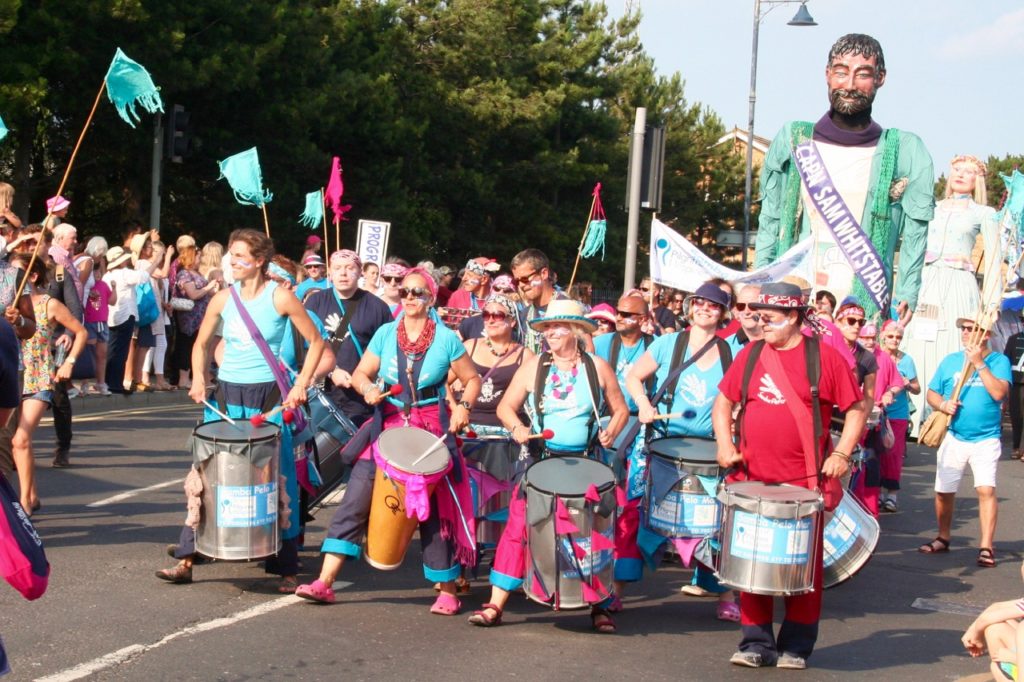
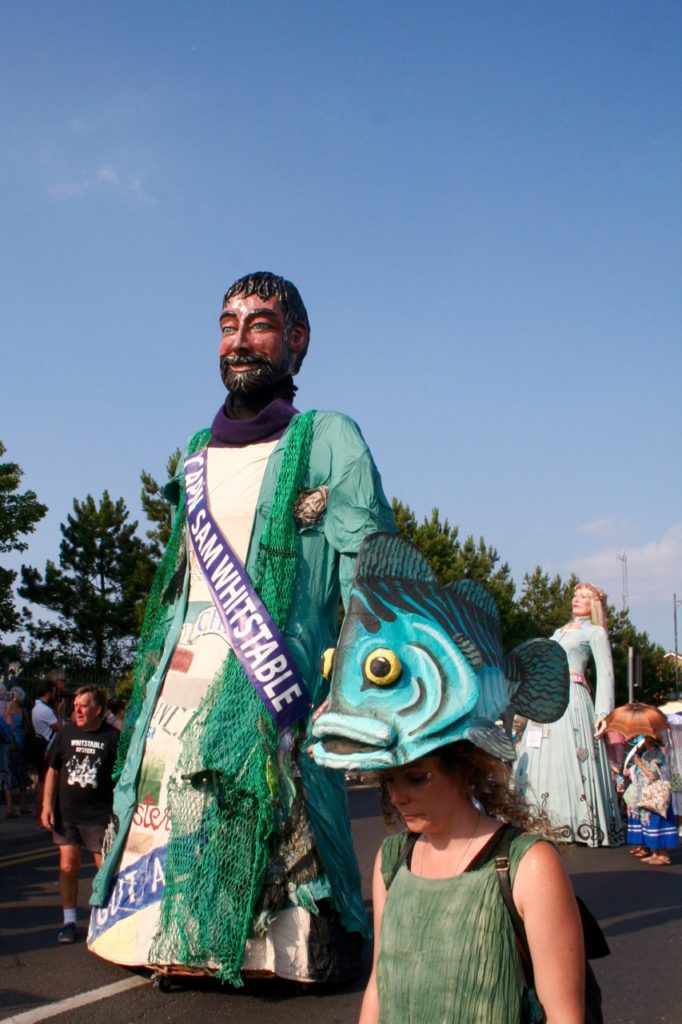
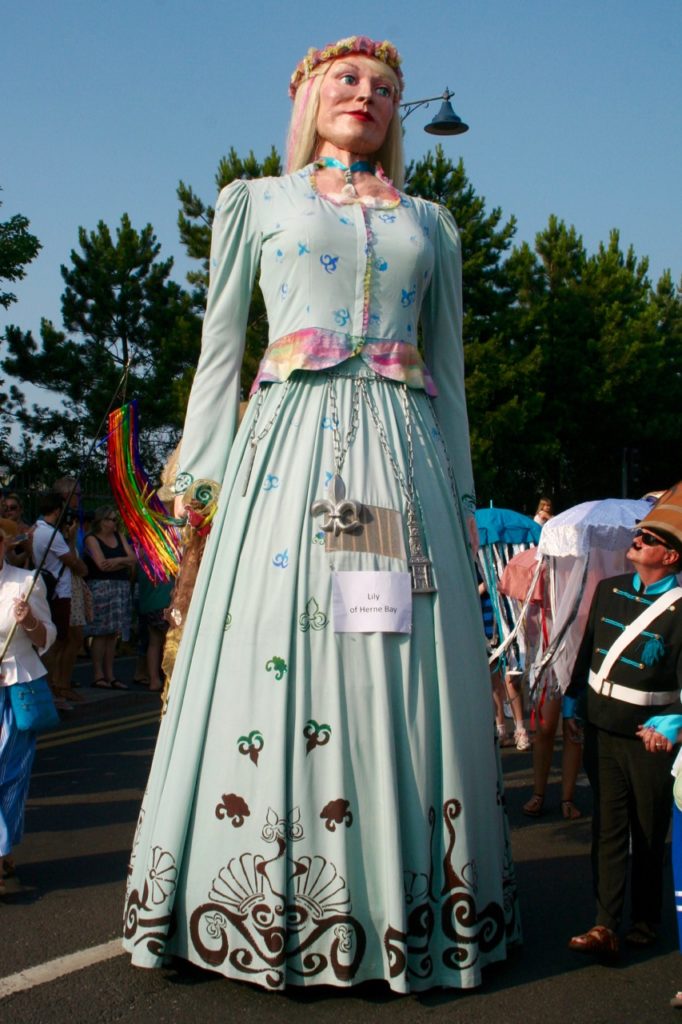
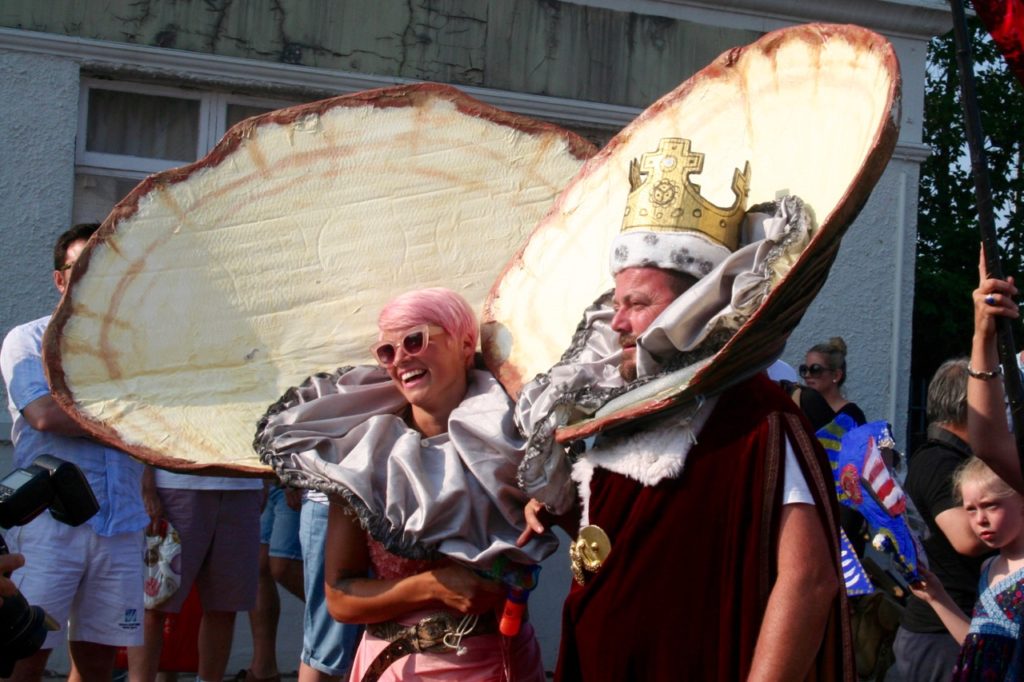
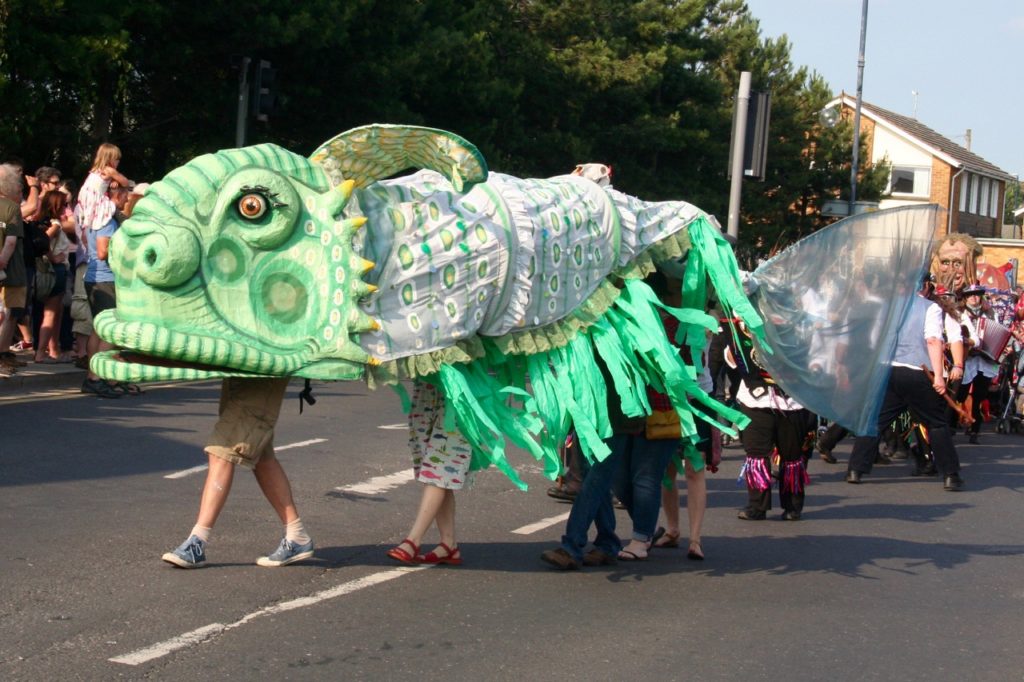
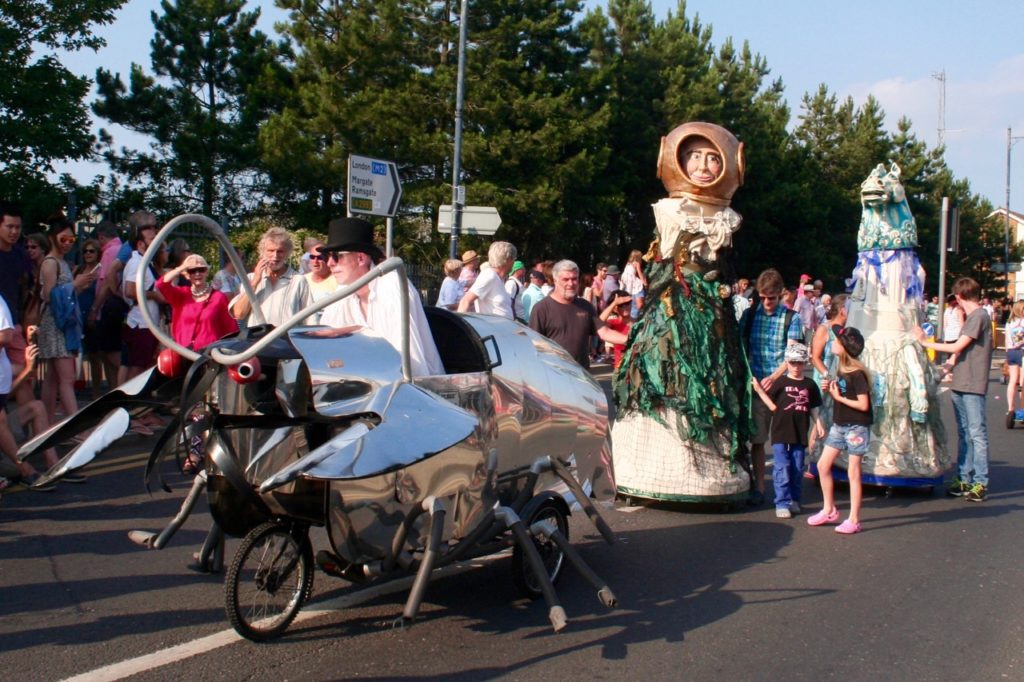
Sir/Madam,
Would you be kind enough to supply me with the history surrounding the building of “Grotters”, now practised during the Whitstable Oyster Festival. Having lived in the town for the last 57 years, and never having heard of this practice before, I would be grateful to be educated in this matter.
Yours expectantly,
Kim Marsden
Hi Kim!
I’m not an expert on the history of the Whitstable Oyster Festival having never had the pleasure yet of attending and living right at the other end of the country! I suspect that the “Grotters” at Whitstable share a common history with the practice of children in the London area of building a shell grotto in the street during early August and collecting money in a similar way to “penny for the guy”. For more on this see Steve Roud’s excellent book “The English Year”. If you click on the link from my page on the festival, you’ll get through to the event website where there is a “contact us” form that goes directly to the organisers of the festival who may well know about just how the “Grotters” came to be a part of it all. If I wasn’t having massive problems sorting out my elderly Mother and her current ill-health I’d have contacted them myself before replying to you but hope you understand I’m a bit distracted right now! Enjoy the festival!
Kind Regards,
Averil
Hi Kim,
Came across this post today almost by accident. Are you the same Kim Ian Marsden that I used to go to school with all those years ago?
Nigel
Nigel, you’ve been waiting 3 years to find out if you did go to school with Kim, I wish she replied buddy haha. I was intrigued.
My father is a Kentish man, as opposed to a Man of Kent, and used to tell us about building “grotters” in the streets of Lewisham where he grew up in the 1920s and 30s. He described it as making things out of sticks and flowers and stones on the pavement and asking people for “a penny for the grotter”.
My mother and all her family comes from Middlesex and we lived in Brentford. I was born in the 1950s My mother used to tease father about not being able to pronounce “grotto”, but father insisted it wasn’t a grotto but a grotter and that the two were different. We never met anyone in the West of London who had heard of a “grotter” and it became a family joke. People to the West of London tended to look down their noses rather from anyone from the East.
It wasn’t until fairly recently that I learned about “grotters” so it turns out that father was correct all along. I take it from the fact that my granparents and my great aunts in Middlesex had never heard of a “grotter” nor had any of my friends grandparents and the practice of making something similar was unheard of that the “grotter” is probably confined to the East side of London, perhaps even to the Kent area.
Hi Ian!
Thanks for sharing the Grotters info – it’s a pity it seems to have died out. I’d like to see one! Steve Roud’s book about The English Year mentions them but I don’t think thy’re very well-known about generally. Maybe they’re ready for a revival?
Kind Regards,
Averil
Hi again Ian!
I meant to ask on my previous reply if you’ve ever seen the modern grotters at the Oyster Festival to compare with the old childrens custom that your father knew? I’m guessing that they’ll be similar in appearance but I’m not sure who builds the new ones. I’ll have to get myself to the Oyster Festival sometime and find out. I guess that having them at the festival might encourage a more general revival, at least in the East side where they seem to have originated. It’s funny how some customs can be localised to a particular area and virtually unknown outside it.
Averil
Interesting to see your questions about the Grotters, I started the oyster festival in 1985/86 I also run the oyster museum for several years before it was turned into a bar
I have many items such as accounts by Dickens and also some very old films that some day I will Re publish;
The festive started in 1793 when the King granted the right for the Free Fishers of Whitstable to run the oyster fishery,this was a co.operative, looking after its old sick and infirmed.The oyster season finnished in April, and the accounts were presented to the free fishers on 25th July St James day, at the end of the meeting profits were shared out and as Dicken states the joyous sound coming from the taverns was not made by people unhappy with there pay, the oyster apprentices would pick the fairest girl in town and parade her on an oyster barrow, the children would build the grotters, in order to try and get a bit of money from the merry oystermen, Whistable sold over 30,000,000 oyster a season(six months) and in most London streets oyster barrows sold them to the poor,”Indeed the poorer the people the more oyster barrows” stated Dickens I suspect the London children soon cottoned on to the practice
N.Godman
Dear Norman,
Thanks for sharing the Grotter information – it sounds like a good time was head by all! I hope to visit one day and see the Grotters and the rest of the festival myself. The old films and accounts sound interesting and I’m sure plenty of other people would like to read and see them. We visited Whitstable for the Jack in the Green festival this year and found it a very friendly place so we’ll be back!
Best Wishes,
Averil
Dear Mr Goodman
I am a second year geography student at Nottingham and am doing my dissertation on the role that the Whitstable Oyster Festival has played in terms of the heritage and place-identity of the town. As such I am trying to get hold of as much info as I can on the festival from its’ start in 1985. As one of the key founders I was wondering if there would be any chance of meeting you as part of my research?
Thank you
Charlie
Hi Charlie,
I’ve forwarded your message directly to Mr Goodman in the hopes that you’ll get a swift reply!
Best wishes with your dissertation research,
Averil
I helped the second year student with his project about the oyster festive he promised me a copy when he had finished it, but I have not received it could he please send me a copy
Hi Norman,
I’ve sent an email to Charlie the student, so hopefully he’ll respond. If you don’t hear from him in a little while, drop me a line and I’ll forward you a copy of his email address if you haven’t got it already. Fingers crossed!
Best wishes,
Averil
Hi Charlie, I’m interested in what you say about the origins of the Oyster Festival. My recollection is that it only started in relatively recent years and probably to increase the influx of visitors and 1985 sounds about right to me. Could you confirm where you sourced this date? Many thanks for your help. Regards. Paul
I have a very keen interest in Whitstable, it is like the oyster craggy and un attractive on the outside, but a wonder to behold when you look into it.
It has many interesting aspects,
THE seven wonders of Whitstable” the first steam railway, the first season ticket, the invention of the diving helmet, the first sea cadets,the first steamship to Australia. the first council houses, the quality kite mark during the war. The book Robin Crusoe was written based on whitstable, Lord Haw Haw the german broadcaster lived and conducted his clandestine activities in Whitstable, the only battle where Germans landen in world war 2 happened in whitstable, Rob roy spratts were caught and canned in whitstable, we also have our far share of TV, and stage personalities, Sir Henry Irvin, the first actor to be Knighted lived at Whitstable.it goes on and on, I give talks to groups, and also conduct tours. together with the films etc that I have, Native Whitstable people
are very insulare having never having to doth their caps to Lords and masters
once you are accepted then there is a wealth to gain from them.
Now that I am retired I intend to get more involved in this most fasinating town and will keep you informed
Sounds like you’re going to have a very busy retirement, Norman – you should put all the Whitstable info into a book or website so that lots of people can share it. Having a website is a good way of finding like-minded people from all over the place! Whitstable is an interesting town – hope to see you at the Oyster Festival one day!
Best Wishes,
Averil
So I have always understood that Native oysters spawn in the warmer summer months and are not then at their best to eat. Hence the old thing about the oyster season being the months with an “r” in their name.
Yet the Oyster Festival kicks off with the “first landing” on mid July, is this because they are the Pacific Rock, not Native oysters?
Can any one explain?
Thanks
Andrea
Hi Andrea
I was able to get the info below from this website:
http://gouk.about.com/od/foodanddrink/qt/When-And-Where-To-Eat-Oysters-In-England.htm
In some parts of England where non-native Pacific and rock oysters are farmed, they’re available throughout the year.
Oyster Myths
Did I say throughout the year? What about only eating oysters in months with an “R” in their name? For years people have believed oysters are unsafe to eat in May, June, July and August. But that’s actually a myth that arose from the fact that those months are the hottest in the Northern Hemisphere and, thus, the months in which oysters are most likely to spoil. Nowadays, raw oysters that are properly kept and served promptly on ice can be eaten throughout the year.
But there is another reason not to eat England’s native oysters May through August – it’s against the law. Native oysters, which take about 5 years to mature, spawn during those non “R” months and they’re protected by an act of Parliament during the spawning season. If the weather has been warm, you might want to stick to the farmed, non-native species in April (when the natives may have started to spawn) and September (when the spawning season may not be quite finished. When they are spawning, native oysters are milky and not very nice.
So, eat them whenever you like as long as they are farmed rock oysters.
I’ll be there in July eating my share.
Happy eating
John C
Hi Norman, My family have been based part time in Sea Salter since the early 60’s and I have grown up here every Summer. I would love to learn more about the History of Whistable as I do like to class my self as an almost native. How can I contact you to come on one of your tours? Thank you kindly.
I was born in whitstable in 1952 lived there till I was 21, My first job was working for Arthur Collar later know as Cakebread Robey, I work there for 5years and never heard of the oyester grotters/grottos I and few lads used to drink regular all through the year, I would like to mention that Peter Cushin was a regular customer in the shop I worked for.
Please would you be kind enough to let me know when the 2020 Oyster Festival dates are when known in order that I can book a hotel room for that weekend.
Much obliged.
Mark Hawkins-Moseling.
Dear Mark,
I’ve just checked the event’s own website at https://www.whitstableoysterfestival.co.uk and their Facebook page at
https://www.facebook.com/pg/whitstableoysterfestival and they don’t seem to have announced the 2020 dates yet, so I’ve messaged the organisers to see if it’s confirmed for next year. From what I remember the announcement of the date is normally well into the New Year, but of course that doesn’t mean that the organisers don’t know earlier – I’ll let you know as soon as I find anything out, and in the meantime keep an eye on the Facebook link as I expect that’s where the dates will first appear,
Best wishes,
Averil